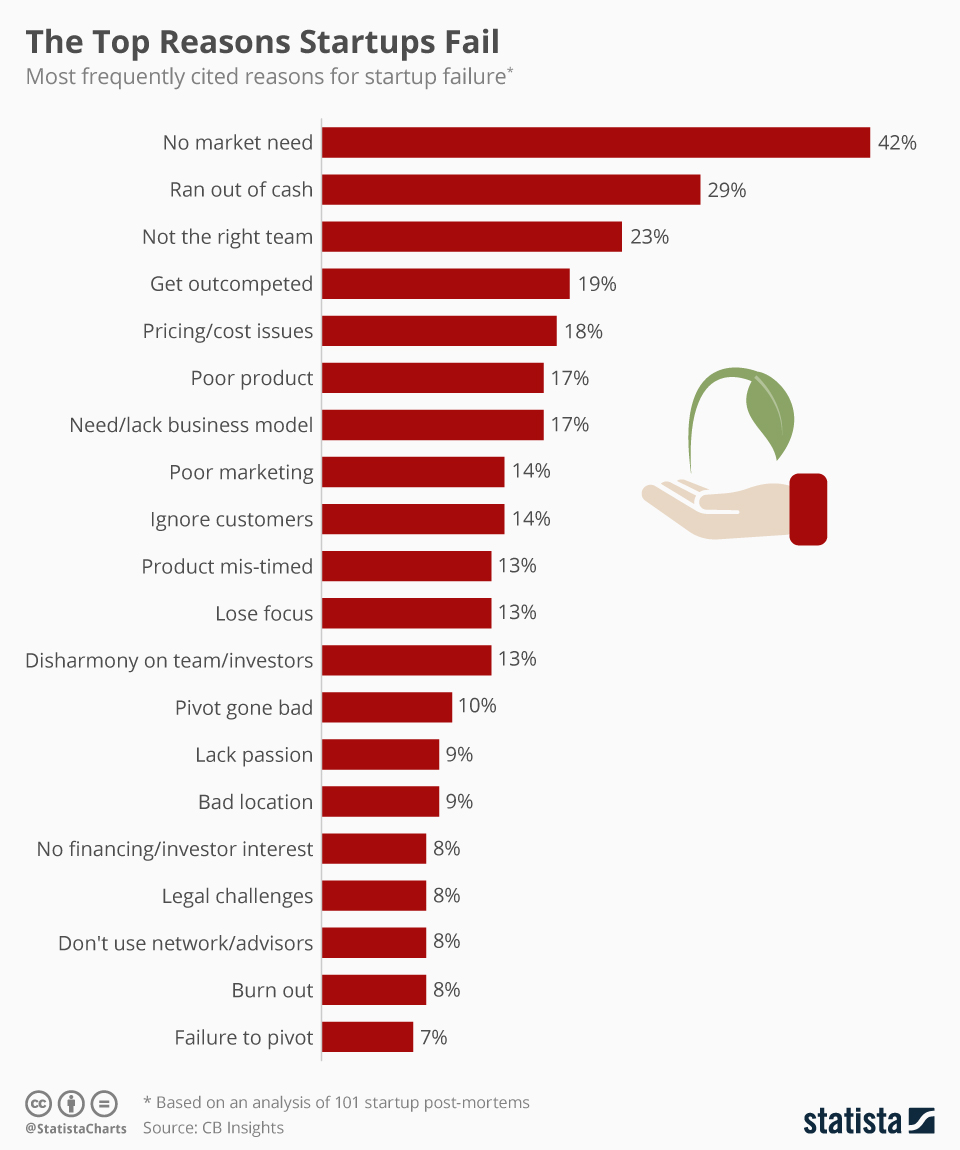
According to Fortune, approximately 90% of technology startups fail, leaving room for one out of 10 businesses to succeed. There’s no doubt that these stats are bleak, but the passionate entrepreneur isn’t fettered or intimidated by the numbers. If you truly believe in your idea or concept, you probably ignore the failure statistics and think they don’t apply to your vision.
Nonetheless, the odds are stacked against you, and it’s worth your while to learn why the majority of startups fail—and how to make yours different. Recently, CB Insights conducted a survey in which they analyzed 101 post-mortem startups—and what went wrong. Made possible by the brave entrepreneurs and investors who had the courage to admit to their mistakes, we now have a concise breakdown of the top reasons most startups don’t succeed. Don’t let fear stop you; check out the graph below and learn from the mistakes made by those before you.

• 42%—No Market Need
Startups fail when they are not solving a market problem. Too many entrepreneurs tackle problems that are interesting, instead of solving a pain point in a scalable way.
• 29%—Ran out of Cash
Not all ventures manage to attract the lucrative investments of successful startups such as Facebook back in 2005. The second most common reason for startup failure is running out of funding. Your money and time are finite so be sure to allocate them judiciously.
• 23%—Not the Right Team
If your team doesn’t feel like there’s any unity, it will result in a downward spiral. There’s many factors that could lead to disharmony.
• 19%—Outcompeted
Ever since the birth of Silicon Valley, startups seem to form every day. Many platitudes instruct startups to not pay attention to the competition, and while it’s never healthy to obsess, ignoring them altogether is a recipe for disaster. If you’re launching a startup in a competitive niche, you have big target on your back; you not only have to contend with various small business, but the big industry leaders will present you with an uphill battle.
• 18%—Pricing Problems
Formulating a successful price structure is a dark art in the startup world. How do you price a product high enough to cover production with a profit margin, but low enough to draw in customers? Finding that sweet spot between not too expensive and not too cheap is a balancing act, and if tipped to either side, could mean failure for your company.
• 17%—Poor Product
No matter great they believe their product, sometimes startup founders just fall short. Without a strong product, it’ll be nearly impossible for your business to grow. Be sure to pay attention to what the market needs and wants.
• 17%—Lack of Business Model
Business models are absolutely essential for startups, but too many entrepreneurs learn this lesson too late. Make it a priority to create a business plan first, which will help you stay committed to your long-term goals.
• 14%—Poor Marketing
No one will know how great your product is if you fail to market it. Even bootstrapping startups need to allocate a budget for marketing efforts. Keep your target audience in mind, learn how to get their attention and know how to convert them to make your marketing less expensive and more efficient.
While there are a seemingly endless number of obstacles facing investors and startup founders, these are the most common occurrences. Don’t let fear stop you. Failure is a learning opportunity, so use these lessons about common startup demise to teach you how to make your company different and stand up against the stacked odds.
